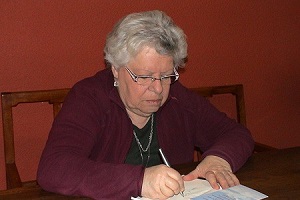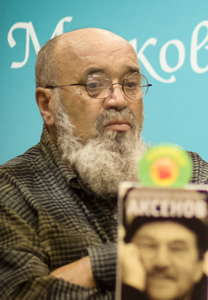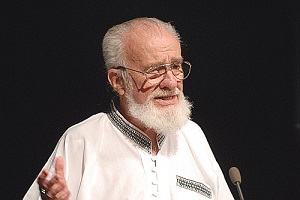De Argentijnse dichteres en schrijfster Luisa Futoransky werd geboren op 5 januari 1939 in Buenos Aires. Zie ook alle tags voor Luisa Futoransky op dit blog.
Tatoong
Golden buddhas of Tatoong with their centers of balance in flames
buddhas with guardians strumming wise mandolins to help them sleep
meanwhile the interpreter strives before a shining trinity
explaining that the figures on the sides are the secretaries
but without specifying as to what faction, which cosmic party
what paperwork they have to fill out to pass from the blue
to the orange of illumination
how many incarnations at the mercy of the elements in the shacks of Yunnan
how much silk and manure and horse sweat
and yak’s milk so that the gust of silence and wind
causes me to doubt my light and shadow
but the Japanese are filming murmured sequences
of martial arts at the feet of the Contemplator
and after we go off in our buses to empty ourselves
of more dinners, more temples, more purchases
what do these tens of thousands of buddhas do at night
to be so happy and composed the next morning?
Circery
I changed
these men into little poems
and confined them to books and journals
because, nowadays,
it’s not worth
going about finding them acorns
or daisies for holy days.
As for Ulysses, the guy from Ithaca,
tell him my oven’s already full
of asps, toads
and mastodons like him.
Besides, the (circus) game
of resurrections
is no longer my specialty.
Now I weave.
Believe me.
Vertaald door Jason Weiss

Luisa Futoransky (Buenos Aires, 5 januari 1939)
De Iraanse dichteres Forough Farokhzad werd geboren op 5 januari 1935 in Teheran. Zie ook alle tags voor Forough Farokhzad op dit blog.
The Bird Was Just A Bird
The birds said:
“What a bright day, what a fresh air!
Spring has arrived.
I must look for my mate.”
The bird fled from the edge of wire.
The bird soared away towards the clouds-
and disappeared fast.
Just like a wish,
Just like a prayer,
Just like a whisper,
The bird spread far and wide-
in the air.
The bird was tiny.
The bird was light.
The bird was not bright,
The bird was lonely,
But the bird, well,
was truly free.
In the sky,
Over the ups and downs of the hills and the lanes,
Over the traffic lights and over the stop signs,
The bird constantly flew.
And,
in the heights of the peace of her dreams,
She finally felt the blue sense of time and space.
The bird, well, was just a bird.
The bird, well, was truly free.
Vertaald door Maryam Dilmaghani
Forough Farokhzad (5 januari 1935 – 13 februari 1967)
De Russische schrijver Yevgeni Anatoljewitsj Popov werd geboren op 5 januari 1946 in Krasnojarsk, Sibirië. Zie ook alle tags voor Yevgeni Popov op dit blog.
Uit: Mein Moskau
„Jahr für Jahr schmückten am 1. Mai und am 7. November die bekannten Figuren der Parteibonzen das Lenin-Mausoleum und die jubilierenden «Vertreter der Werktätigen» den Roten Platz; letztere trugen rote Fahnen sowie die Portraits eben jener «Diener des Volkes», welche auf dem Mausoleum standen.
Jahrelang bestürmten Dichter und Schriftsteller erfolglos die Zeitschriftenredaktionen und Verlage, bis sie zu Dissidenten oder Emigranten wurden, oder sie nahmen die Spielregeln an und stärkten die Reihen der sowjetischen «Kulturarbeiter».
Trotzdem, das war nur Moskaus äussere Hülle. Alle wussten (und ich glaube nicht, dass die Perestroika noch jemandem die Augen öffnen musste), dass es sich mit Moskau nicht so einfach verhielt, dass unter der dünnen Kruste erstarrter kommunistischer Lava vulkanische Leidenschaften brodelten: Kommunisten prügelten sich um die Macht und richteten sich um der Karriere willen gegenseitig zugrunde, Untergrundmilizionäre mehrten ihr Vermögen, wer mochte, konnte in Moskau jedes, auch das «antisowjetischste» Buch auftreiben, und der Siegeszug der Ideen von Marx und Lenin über den Planeten verhinderte keinesfalls, dass es in der Zitadelle des Kommunismus sowohl Prostituierte, Devisenschieber, Spekulanten, Diebe und Banditen als auch andersdenkende Philosophen, Schriftsteller und Künstler gab, aber auch ehrliche Durchschnittsbürger, denen jede Ideologie gestohlen bleiben konnte.“

Yevgeni Popov (Krasnojarsk, 5 januari 1946)
De Amerikaanse dichter William De Witt Snodgrass werd geboren op 5 januari 1926 in Wilkinsburg, Pennsylvania. Zie ook alle tags voor William Snodgrass op dit blog.
Who Steals My Good Name
For the person who obtained my debit card number and spent $11,000 in five days
My pale stepdaughter, just off the school bus,
Scowled, ‘Well, that’s the last time I say my name’s
Snodgrass!’ Just so, may that anonymous
Mexican male who prodigally claims
My clan lines, identity and the sixteen
Digits that unlock my bank account,
Think twice. That less than proper name’s been
Taken by three ex-wives, each for an amount
Past all you’ve squandered, each more than pleased
To change it back. That surname you affect
May have more consequence than getting teased
By dumb kids or tracked down by bank detectives.
Don’t underrate its history: one of ours played
Piano on his prison’s weekly broadcast;
One got rich on a scammed quiz show; one made
A bungle costing the World Series. My own past
Could subject you to guilt by association:
If you write anything more than false checks,
Abandon all hope of large press publication
Or prizes—critics shun the name like sex
Without a condom. Whoever steals my purse
Helps chain me to my writing desk again
For fun and profit. So take thanks with my curse:
May your pen name help send you to your pen.

William Snodgrass (5 januari 1926 – 13 januari 2009)
Zie voor nog meer schrijvers van de 5e januari ook mijn vorige blog van vandaag.
